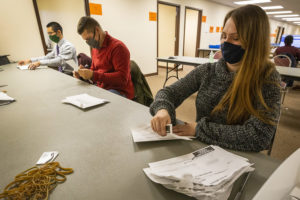
U.S. Air Force Airman 1st Class Makayla P. Mehaffey, right, Senior Airman Michael S. Kragh, center, and Airman 1st Class Alejandro Ng Feng, all with the 177th Fighter Wing, New Jersey Air National Guard, processes ballots at the Board of Elections Mail-In Ballot Processing Center, Mays Landing, N.J., Nov. 3, 2020. (This photo has been altered by blurring out personal information on the ballots.) (New Jersey National Guard photo by Mark C. Olsen)
In Pennsylvania, Secretary of State Kathy Boockvar submitted guidance just days before election day that reportedly allowed voters missing proof of identification to cure their mail-in ballots until Nov. 12, according to BRIGHT editors. “Yesterday, a judge in Pennsylvania ruled that voters who needed to show proof of identification and failed to do so by November 9th must have their ballots disqualified, as is in accordance with state law.”
The judge agreed with Trump Campaign and the Republican National Committee’s argument that Boockvar did not have the ability to authorize a change in the identification deadline because state law did not permit it.
The Beauty of Ballot Harvesting
This year’s presidential election offered the perfect environment for ballot harvesting. The beauty of ballot harvesting, as Kimberley Strassel explains in the WSJ, is the difficulty in proving fraud.
How many harvesters offered to deliver votes, only to throw away inconvenient ones? How many voters were pushed or cajoled, or even paid—or had a ballot filled and returned for them without their knowledge? And this is before questions of what other mischief went on amid millions of mailed ballots (which went to wrong addresses or deceased people) and reduced voter verification rules. As the Heritage Foundation’s election expert Hans von Spakovsky has explained, mail-in voting is the “single worst form of election possible” because “it moves the entire election beyond the oversight of election officials.”
Despite Democrats campaigning on a slew of urgent priorities – health care, climate change, immigration, student debt – House Speaker Nancy Pelosi unveiled a 600-plus-page bill devoted to “election reform,” continues KS.
Some of the legislation was aimed at weaponizing campaign-finance law, giving Democrats more power to control political speech and to intimidate opponents. But the bill was equally focused on empowering the federal government to dictate how states conduct elections—with new rules designed to water down ballot integrity and to corral huge new tranches of Democratic voters.
For The People Act?
Democrats grandly named their bill the For The People Act, but conservatives had better titles. This page called it the “Majority Preservation Act,” while the editors at National Review described it as an “Unconstitutional, Authoritarian Power Grab.” Senate Majority Leader Mitch McConnell decried the bill as a “naked attempt to change the rules of American politics to benefit one party,” and dubbed it the “Democrat Politician Protection Act.”
Mrs. Pelosi’s bill didn’t become law, despite her attempts this year to jam some of its provisions into coronavirus bills. But it turns out she didn’t really need it. Using the virus as an excuse, Democratic and liberal groups brought scores of lawsuits to force states to adopt its provisions. Many Democratic politicians and courts happily agreed. States mailed out ballots to everyone. Judges disregarded statutory deadlines for receipt of votes. They scrapped absentee-ballot witness requirements. States set up curbside voting and drop-off boxes. They signed off on ballot harvesting.
Given the Coronavirus pandemic, Republicans were hard pressed to fight changes.
The question, asks Ms. Strassel, do they now understand the stakes?
This election was a mere glimpse of the system Mrs. Pelosi wants nationwide, and she has already suggested “election reform” might again be her first priority in 2021. The GOP’s job is to harness voters’ frustration about the murky mess that was this year’s vote into a movement that demands transparency and renewed integrity of the ballot. Or risk a lot of 2020 repeats.




